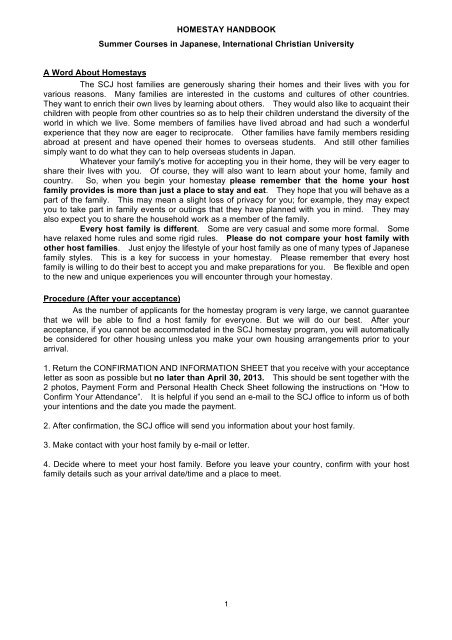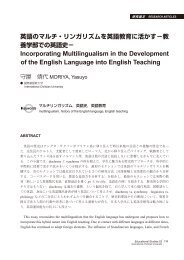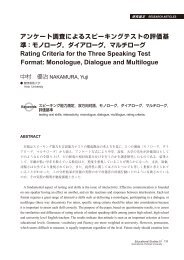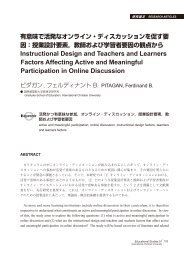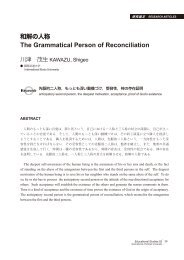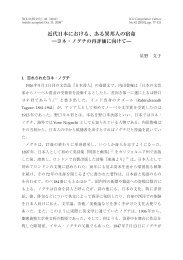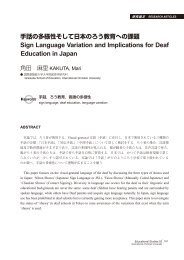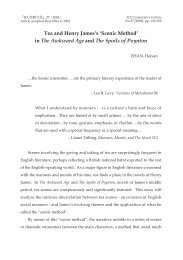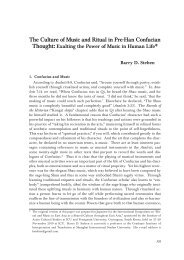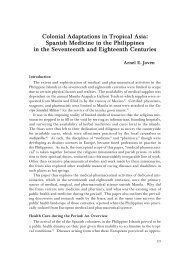13 HOMESTAY HANDBOOK.pdf - icu.ac.jp - 国際基督教大学
13 HOMESTAY HANDBOOK.pdf - icu.ac.jp - 国際基督教大学
13 HOMESTAY HANDBOOK.pdf - icu.ac.jp - 国際基督教大学
Create successful ePaper yourself
Turn your PDF publications into a flip-book with our unique Google optimized e-Paper software.
<strong>HOMESTAY</strong> <strong>HANDBOOK</strong><br />
Summer Courses in Japanese, International Christian University<br />
A Word About Homestays<br />
The SCJ host families are generously sharing their homes and their lives with you for<br />
various reasons. Many families are interested in the customs and cultures of other countries.<br />
They want to enrich their own lives by learning about others. They would also like to acquaint their<br />
children with people from other countries so as to help their children understand the diversity of the<br />
world in which we live. Some members of families have lived abroad and had such a wonderful<br />
experience that they now are eager to reciprocate. Other families have family members residing<br />
abroad at present and have opened their homes to overseas students. And still other families<br />
simply want to do what they can to help overseas students in Japan.<br />
Whatever your family's motive for accepting you in their home, they will be very eager to<br />
share their lives with you. Of course, they will also want to learn about your home, family and<br />
country. So, when you begin your homestay please remember that the home your host<br />
family provides is more than just a place to stay and eat. They hope that you will behave as a<br />
part of the family. This may mean a slight loss of privacy for you; for example, they may expect<br />
you to take part in family events or outings that they have planned with you in mind. They may<br />
also expect you to share the household work as a member of the family.<br />
Every host family is different. Some are very casual and some more formal. Some<br />
have relaxed home rules and some rigid rules. Please do not compare your host family with<br />
other host families. Just enjoy the lifestyle of your host family as one of many types of Japanese<br />
family styles. This is a key for success in your homestay. Please remember that every host<br />
family is willing to do their best to accept you and make preparations for you. Be flexible and open<br />
to the new and unique experiences you will encounter through your homestay.<br />
Procedure (After your acceptance)<br />
As the number of applicants for the homestay program is very large, we cannot guarantee<br />
that we will be able to find a host family for everyone. But we will do our best. After your<br />
acceptance, if you cannot be accommodated in the SCJ homestay program, you will automatically<br />
be considered for other housing unless you make your own housing arrangements prior to your<br />
arrival.<br />
1. Return the CONFIRMATION AND INFORMATION SHEET that you receive with your acceptance<br />
letter as soon as possible but no later than April 30, 20<strong>13</strong>. This should be sent together with the<br />
2 photos, Payment Form and Personal Health Check Sheet following the instructions on “How to<br />
Confirm Your Attendance”. It is helpful if you send an e-mail to the SCJ office to inform us of both<br />
your intentions and the date you made the payment.<br />
2. After confirmation, the SCJ office will send you information about your host family.<br />
3. Make contact with your host family by e-mail or letter.<br />
4. Decide where to meet your host family. Before you leave your country, confirm with your host<br />
family details such as your arrival date/time and a place to meet.<br />
1
Conditions<br />
1. Dates: Your homestay begins July 3 and ends August 16. Do not expect your host family to<br />
make their home accessible to you before July 3 and do not stay after August 16. Honor your host<br />
family's privacy. Please do not expect your host family to meet you at the airport, as this will<br />
be quite an imposition. You may arrange to meet them at the train station nearest to their home, or<br />
at the ICU SCJ office (during office hours). These details must be decided directly between you<br />
and your host family.<br />
July 3<br />
2. Location: Within 60 minutes of ICU by bicycle, bus, or train (one way)<br />
3. Fees: ¥100,000. Includes 2 meals/weekday, and if participants are home over weekends<br />
also includes 3 meals on Saturdays and Sundays.<br />
Does not include commuting costs. Please budget approximately<br />
¥20,000—¥30,000 for commute costs to ICU for the entire six weeks. Commuting to ICU may take<br />
up to 60 minutes one way. This fee also does not include other transportation costs and personal<br />
expenses such as stationery, meals eaten outside your host family’s home, etc.<br />
*You should pay the homestay fee (¥100,000) in cash directly to your host family immediately upon<br />
arriving at your host family's home. It is Japanese custom to put money in an envelope when<br />
making a payment. Your host family will be pleased if you follow this custom.<br />
4. Food: Contrary to what many people believe, Japanese people are rarely vegetarians.<br />
Fish is a dietary staple and many meals include beef, pork, or chicken in some form. Fish stock is<br />
used in many Japanese dishes. If you are a vegetarian or if you have an unusual diet, you may wish<br />
to re-think your homestay plans because few families are able to make special dietary provisions.<br />
In fact, one of the conditions many families request of their student visitors is that he or she has a<br />
balanced diet. It will be difficult for host mothers to plan meals around particular dietary requests.<br />
5. On-campus dormitory is closed to all non-residents:<br />
If you choose homestay, you cannot enter the on-campus dormitory. Only residents can enter the<br />
dormitory. This may limit access to your classmates who stay in the dormitory. The cafeteria is open<br />
to everybody and is a great place to spend time together.<br />
2<br />
August 16
Preparations for Your Homestay<br />
1. Please learn as much as you can about Japanese language, culture and customs before<br />
coming to Japan. This is helpful in communicating with each other. Also, you should prepare<br />
yourself for questions about such topics as your own country’s culture, customs and history. You<br />
might be asked those questions and it will be interesting for everyone if you are able to share<br />
information about such topics with one another.<br />
2. Since your host family will be curious about your life back home, it might be a good idea to<br />
have photographs of your family and home on hand to share with them. If your home country or<br />
state is famous for a certain product or craft, your host family might enjoy it if you are able to bring a<br />
sample of it with you. They do not expect any gifts from you but would certainly enjoy a small<br />
souvenir with which to remember you by. Please don’t bring anything too big or expensive as your<br />
host family may feel pressure to give something similar in return.<br />
3. If possible, please learn how to cook some of the foods you eat at home so you can share<br />
this experience with your host family.<br />
During Your Homestay<br />
1. Once you meet your family, please ask about the house rules. For example, ask about<br />
when your family eats breakfast and dinner, rules about bathing, laundry, using the phone or<br />
internet, and a nightly curfew (yes, many families will actually set a curfew). Once you’ve asked<br />
about the rules, obey them! Please refer to the sample questions in the last part of this handbook.<br />
2. Your family will feel responsible for you. Please let them know where you are going<br />
when you go out. If you are going to be home late, please let them know when and why.<br />
Some families will set a curfew and will expect you to keep it. Do your best to cooperate.<br />
3. Your family has agreed to provide you with two meals a day. If you have plans for the<br />
evening and will miss dinner, please let your family know well in advance so that they can plan<br />
their meals accordingly.<br />
Today, I will eat out with<br />
friends.<br />
3
4. Your family will be worried if you cannot eat the foods they serve. Try all foods offered<br />
to you. It is also helpful to tell your host family about your likes and dislikes.<br />
Your host family might also enjoy it if you try to cook some of the foods you eat at home.<br />
5. Help with household chores as needed. After dinner, offer to help with the dishes, or at<br />
least clean up your own dishes. Remember, you are not just a guest but a part of the family.<br />
.<br />
6. Keep your room neat. You will be expected to make your own bed. If you use a futon,<br />
you should fold it up every morning and take it out every evening. Do not scatter your personal<br />
belongings throughout the house. Ask how to use the washing machine and offer to do your own<br />
laundry.<br />
7. Respect your family's sense of modesty and do not dress too scantily when using the<br />
bathroom and other shared areas of the house. Take your cue from the way other family members<br />
dress.<br />
4
8. Having a bath in Japan is very different. Most families take a bath in the evening. If<br />
you cannot survive without a morning shower, please inform your family of this and find out what is<br />
convenient. Otherwise, take your bath in the evening. Sometimes, Japanese families pay<br />
particular care to the order in which members of the family use the bathroom when bathing, so<br />
please ask first when and how you ought to bathe.<br />
If you are asked to bathe first and the water is too hot, add a little cold water, but remember that<br />
other family members will use the same water to bathe after you, so do not make it too cool. You<br />
must wash your body outside the tub and use the tub only to soak. Do not put soap in the tub!<br />
After taking a bath in your host family's bathtub, please do not drain the tub. Leave the hot water<br />
for the next person. Sharing hot bath water is a long-standing Japanese custom that helps save<br />
water. We hope you will follow your host family's custom.<br />
Finally, use your own bathing products (shampoo, towel, etc.) and do not "share" the family's unless<br />
otherwise indicated.<br />
9. As you probably know, you must remove your shoes before entering the house.<br />
Ordinarily, after you take off your shoes at the entrance (genkan), arrange them neatly. However,<br />
the ‘formal’ way to put away your shoes is to put them in the shoe cabinet (getabako) or wherever<br />
you are instructed.<br />
While at home you should wear the slippers provided. Most Japanese people wear slippers in the<br />
house even in summer. You will find a separate pair of slippers in the toilet. Leave your house<br />
slippers outside the toilet door and step into the toilet slippers. Remember to change slippers when<br />
you leave the toilet!<br />
5
10. Do not use the host family's telephone for calling overseas unless you make a<br />
collect call. To avoid any misunderstanding over paying the telephone bill, make all long distance<br />
and international calls from a pay phone. Your host family will not be willing to accept collect calls<br />
from abroad.<br />
Also, please note that local calls are also expensive. Please do not make too many local<br />
calls and do not talk for a long period of time. If you need to make a lengthy phone call, use a pay<br />
phone. A mobile phone is useful for contacting your family, especially in emergencies. The best<br />
options are either to rent a phone at the airport or to bring your own phone, enabled for use in Japan.<br />
It is very difficult to rent a phone at phone shops away from the airport, and if you are under 20 you<br />
must have someone to act as your guarantor. Your host family or ICU CANNOT act as your<br />
guarantor/contract holder. The mobile phone is your responsibility alone.<br />
11. Do not use your host family’s Internet service without first receiving their permission. If your<br />
host family allows you to access the Internet from their home, make sure to let them know how long<br />
you will be online and try not to use this service continuously. Less than 30 minutes is ideal.<br />
Wireless LAN might be available in some homes however, try not to use Skype, MSN/Yahoo<br />
messenger or other Internet phone or chat services too much. Homestay programs are intended<br />
to provide valuable chances to improve your spoken Japanese. Therefore, we hope you will take<br />
advantage of the opportunities to spend time with your host family rather than chatting on the<br />
internet all the time. Please be aware that computers and Internet are available for SCJ<br />
participants at the university library.<br />
12. Ask your host family how to use the air conditioner and follow their instructions. Usually,<br />
your family will set the air conditioner to 28°C, since the Ministry of the Environment recommends<br />
this. It also saves on electricity. Summer weather in Japan is very hot and humid but do not lower<br />
the temperature without asking your host family. Please do not open the windows when the air<br />
conditioner is on.<br />
<strong>13</strong>. Your host family may not be happy about friends coming home with you, particularly when<br />
no one else is at home. They may feel especially reluctant for you to entertain members of the<br />
opposite sex or your boyfriend/girlfriend in their home. Please find out how they feel about<br />
additional guests.<br />
6


